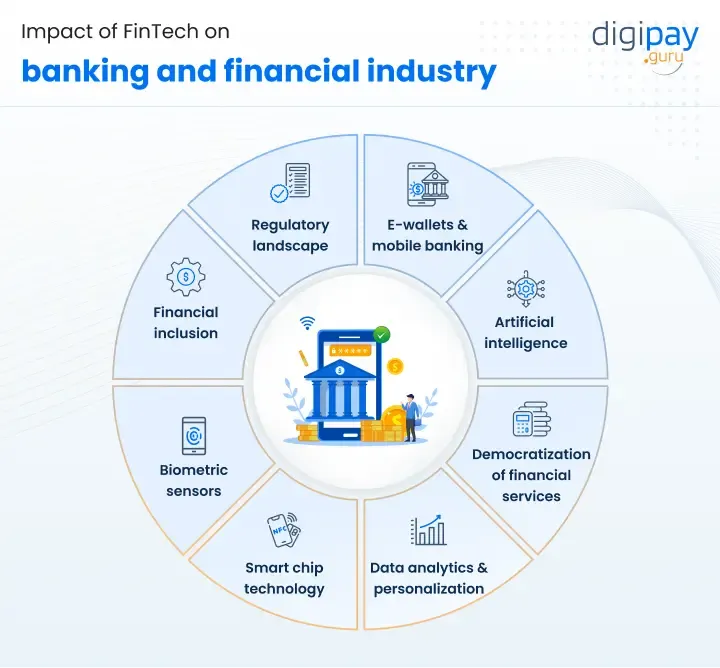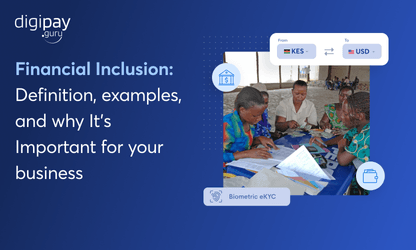FinTech solutions have become a norm due to the rise in startups in the past decade. It has revolutionized many financial businesses by making them acquainted with the technology.
For banks, fintech brings a customer-centric approach, which can make them a customers’ first choice. Many banks have successfully leveraged the power of FinTech to modernize their services for changing customer demand.
In this blog, you will learn what Fintech is, why bank-fintech collaboration is a good move, and how FinTech is changing the banking and financial industry.
Let’s start with the overview of FinTech!
What is FinTech?
FinTech is short for ‘financial technology’ which refers to the use of technology to improve, automate, and provide innovative financial services.
It is used to enable banks, financial institutions, companies, and consumers to better manage their financial operations, processes, and lives.
Financial services and technology encourage the use of digital technology in startups so that they can come up with innovative financial products and services, such as;
- Mobile payments
- Alternative finance
- Online banking
- Big data
- Robo advisors
- Peer-to-peer lending
- Crowdfunding, & more
Statistics signifying the importance of FinTech
- The global fintech industry is expected to be worth $917.17 billion by 2032. Currently, it is around $226.71 billion.
- There were nearly 13,100 fintech in the United States of America in January 2024, which is almost 1,500 more than in 2023.
- The fintech revenues are expected to grow globally to $197.8 billion in 2024 with America - $66.3 billion, EMEA - $30.5 billion, and Asia Pacific - $101 billion.
- Revenues in the fintech industry are expected to grow almost 3x faster than those in the traditional banking sector – says McKinsey.
The above statistics signify the growing importance of FinTech in the financial industry. And so leveraging FinTech will only mean success for banks.
Now it’s time to learn why FinTech and Bank together can do wonders for the financial industry.
Let’s get into it!
Why FinTech and banks should work together?

Hence, a collaboration between the two is essential. Here’s why!
Increased efficiency
With FinTech in the banking industry, they can leverage one another’s strengths to streamline processes, automate tasks, and improve overall operational efficiency.
- FinTech can provide banks with access to cutting-edge technologies
- Banks can offer FinTech companies the regulatory expertise and customer base they need to scale their operations.
Access to new technologies
Collaboration between FinTech and banks allows both parties to access and implement the latest technological advancements.
- Banks can benefit from FinTech's innovation and agility
- FinTech companies can leverage the resources and infrastructure of traditional banks to expand their reach and impact.
Cost reduction
Through strategic partnerships, banks and FinTech companies can cut the costs associated with developing and integrating new technologies. These savings after the costs-cut, can be passed on to customers via lower fees and more competitive product offerings.
For instance, a credit union teamed up with a FinTech offering cloud-based banking fintech software. By migrating their operations to the cloud, the credit union eliminates the need for costly on-premises infrastructure and reduces maintenance expenses.
Improved security
FinTech companies often prioritize security and data protection as financial transactions are sensitive.
By collaborating with FinTech, banks can enhance their security measures, mitigate the risk of cyber threats, and protect their customers' sensitive information.
Enhanced customer experience
Fintech companies have disrupted the financial services industry with their innovative approach to customer experience.
They have a reputation for being faster, affordable, efficient, and secure than traditional banks.
This has led to many fintech companies earning the trust of their customers through exceptional service and referral-based client acquisition.
Banks can adopt FinTech’s customer-centric approach. This can lead to better service for customers and ultimately increase their trust and loyalty to the bank.
Increased transparency
FinTech companies are often praised for their commitment to transparency. This can positively influence the banking industry.
Through collaboration with FinTech, banks can adopt more transparent practices, such as clear fee structures, easily accessible account information and interest calculations. This ultimately builds greater trust with the customers.
Improved accessibility
FinTech can extend financial services to underserved/unbanked populations, particularly in emerging markets.
By partnering with FinTech companies, banks can reach new customer segments, increase financial inclusion, and contribute to the overall economic development of countries.
Better branding
The impact of fintech on banking can be positive for their brand image.
By embracing innovation and showcasing their commitment to technological advancements, banks can position themselves as modern, forward-thinking, and customer-centric financial institutions. This way banks can attract a new generation of tech-savvy customers.
How fintech is changing the banking and financial industry
Now, you know that fintech and banking working together is the cherry on the cake for the customers. They get banking services at home and experience the technological advancements it has to offer.

Moreover, the banking and financial industry is witnessing the decade's biggest shift due to digital fintech solutions. Here’s how fintech is impacting the banking industry;
E-wallets & mobile banking

E-wallets have transformed the way customers make payments. Now, it's digital payments with advanced features that have made payments fast, secure, and convenient.
E-wallets are positively impacting the banking industry by being the major source of digital payments. The users need to add their bank account details to the wallet to add funds. This leads to an increased customer base for banks as well.

The increase in the use of smartphones has compelled banks to launch their mobile applications that offer convenient FinTech banking services. It worked so well for banks that the global banking industry is expected to generate $7 billion by 2032.
Today, most banks have a mobile banking application with;
- User-friendly interface
- Ability to deliver almost every service available in traditional banks
- Advanced security features like fingerprint and facial recognition
Read more: How mobile banking is transforming banks across the globe?
Artificial intelligence
FinTech can offer AI-powered solutions that can transform the banking and financial industry. FinTech companies are leveraging AI to;
- Automate & streamline processes
- Provide personalized financial advice
- Detect fraud or security breaches, and
- Enhance customer service
So, leveraging AI and ML in financial services can help banks automate their processes, prevent fraud, and get detailed insights for making informed decisions.
Democratization of financial services
FinTech has played a pivotal role in democratizing financial services and has made them more accessible to a wider range of individuals and businesses.
FinTech is leveraging digital platforms & mobile technologies to break the barrier to enter into the financial ecosystem. This empowers the unbanked/underserved potential customers to access financial services easily.
Data analytics and personalization
FinTech companies are harnessing the power of data analytics to provide customers with highly personalized & innovative financial products and services.
The advanced analytics feature in the FinTech apps allows them to analyze customer behavior, spending patterns, and credit history.
Utilizing this data, FinTech can offer tailored solutions to their customers. And by leveraging FinTech solutions, banks can too!
Smart chip technology
Smart chip technology, also known as EMV (Europay, Mastercard, Visa) has significantly impacted the financial sector.
One of the most noticeable impacts of smart chip technology on the banking industry is that it has increased the security of payment transactions. These chips create unique codes for each transaction, which makes it difficult for fraudsters to gain unauthorized access.
Biometric sensors
FinTech has brought great innovation to the banking industry with its biometric sensors feature. Almost all the top fintech predictions and trends have mentions of this innovation.
Today, biometric sensors can be integrated into financial services like mobile banking, online payments, and ATM transactions. These sensors promote enhanced security, improved convenience, and reduced fraud risks in the financial sector.
Financial inclusion
FinTech can drive financial inclusion by reaching unbanked and underserved populations by providing access to essential financial services.
Through mobile banking, cross-border remittance, and agency banking solutions, FinTech companies are enabling banks to reach more customers (banked or unbanked) from across the globe.
Regulatory landscape
FinTech’s AI-powered capabilities and security features can easily adhere to all compliance and security standards of the regulatory bodies.
So when banks collaborate with FinTech, the regulatory landscape becomes less complex and easy to comply with.
Conclusion
As we saw, FinTech has now become the heart of the banking and financial industry. Every bank that is thriving today is because of the implementation of some FinTech solutions into their system.
The impact of fintech on banking is great as it makes them faster, more secure, efficient, and cost-effective - everything the customers need. In the coming years, it is all set to become bigger & better with its fintech solutions.
DigiPay.Guru’s mission is to empower banks & fintechs with our digital fintech solutions. And so, we welcome the effective collaboration of banks and FinTech which will only boost the global financial sector.




